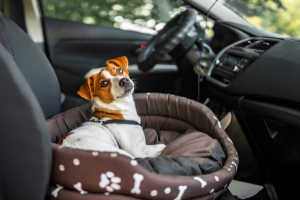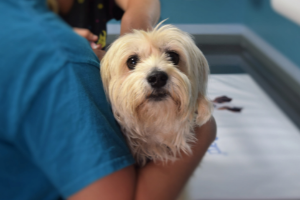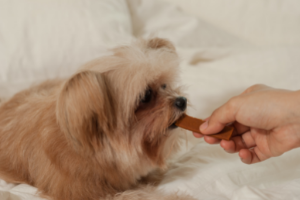We know that not all pets love hopping in the car and realising they’re headed for the vet. This especially rings true for cats. That being said, is there anything you can do to make these trips a little less stressful for everyone involved? Yes! Today we’ll cover a few trips to make your vet visits their best.
Take a breath and relax.
If you’re anxious, it’s likely your pet will be anxious too. Animals are excellent at picking up on our emotions and behaviors. If you are calm, on time, and prepared for the visit it can make a huge difference in your pet’s anxiety levels.
Bring your pet HUNGRY!
Our pets love treats, so bring your pet to the vet hungry! Not feeding your pet prior to a vet visit allows for rewarding pets with treats as they are more likely to show interest. This helps create a more positive environment for your pet, and also allows for successful recognition of desired behaviours.
BONUS – many blood tests at the vet are better done fasted (on an empty stomach). Not feeding your pet within 6-12 hours of your visit may also help your vet if they need to do these tests. We know this can’t always be planned for as some problems are booked for an appointment the same day. However, when given the chance, an empty stomach can be helpful for many reasons.
Get your pet used to car trips.
If the only time your pet gets in the car is to go to the vet, no doubt they’ll be less than thrilled to hop in. Get your pet used to riding in the car over time. This will help ease anxiety and also break any direct correlation in their mind between the car and the vet! This is just as true for cats as it is for dogs. Short, frequent trips to places they enjoy, like the park, can help them learn the car is not so scary.

Get your pet used to handling.
If you have the opportunity to get your pet used to handling, the earlier you start the better. It makes vets jobs so much easier to examine your pet if the pet is used to having their bodies touched. This means regularly touching your pets feet, tummy, head, ears, etc. This is also true when it comes to looking in your pets mouth. Get them used to lifting up their lips to look at their teeth.
Their crate should be a safe place.
Similarly to the car, if the only time your pet goes into a crate/carrier is to go to the vet, of course it can become a nightmare getting them into it! We strongly encourage getting your pet used to their crate/carrier as early as possible. If you don’t have a place to leave the carrier out all the time, we suggest leaving it out for a week or so before the appointment in a place where your pet can go in and out as they please. Make the crate a place of comfort! Putting their favourite blankets, toys, or treats in the crate helps make it safe and desirable. It also makes it more likely they will not fight against you to go in the crate when the time comes to go to the vet.
Keep things familiar.
Take things that smell or remind your pet of home with you to the vet. This includes blankets, toys, and treats. It helps retain some form of routine for them, as we know our pets are absolutely creatures of habit.

Wait in the car.
If you know your pet is anxious, ask your vet if you can wait in the car or an area outside rather than in a potentially noisy waiting area. This is extremely important for nervous creatures, particularly cats. The longer they sit in a scary environment PRIOR to their appointment, the harder the actual exam/treatments will be for them. Even if your pet is NOT normally anxious, a busy waiting room with other animals can be stressful and overwhelming for even the best behaved pets.
Don’t be afraid of supplements, and in some cases – prescription medications.
Consider using nutraceuticals/supplements that help with anxiety for your trip to the vet. We love the pheromone spray Feliway for cats. Spraying their crate prior to leaving, as well as a towel or blanket to put OVER their carrier can help. Decreasing visual stimulation for cats can significantly decrease anxiety. Additionally, some very nervous pets can benefit substantially from prescription medications from your vet for anxiety. This may be something they take regularly if anxiety is an issue at home, but there are also safe and successful options that can be given just prior to trips to the vet to take the edge off. Ask your vet if they think this option would be right for your pet!
Reward, reward, reward.
Animals respond and learn best when we reward a positive behaviour with a positive reward. This means that when our pets do a behaviour we desire at the vet, rewarding them is all the more important to encourage these repeat behaviours in the future.

Go to the vet occasionally even when your pet doesn’t have an appointment scheduled.
This can be challenging for cats because they are so easily stressed, but for dogs there is more of a unique opportunity to visit your vets. Even if it’s solely to get a treat and some loving attention from the staff! This helps your dog associate the vet with more positive experiences, not just going for vaccinations or when they are sick.
Your pet relies on both you and your vet team to provide the support and training for their vet trips! Going to the vet is an important and inevitable part of being a pet owner, so let’s make the trips easier for you, your vet team, and most of all our beloved pets.
Dr. Kirsten Ronngren, DVM MRCVS
Want to get your pet’s parasite prevention sorted today? Click here to get started.